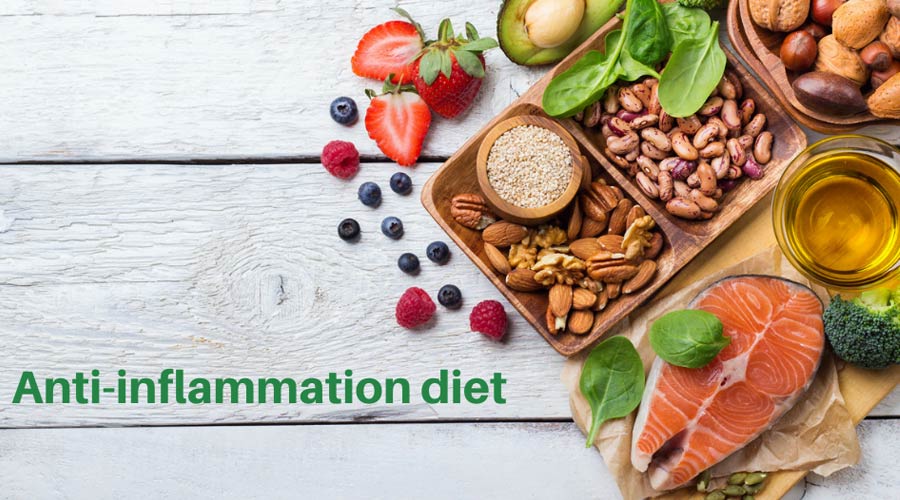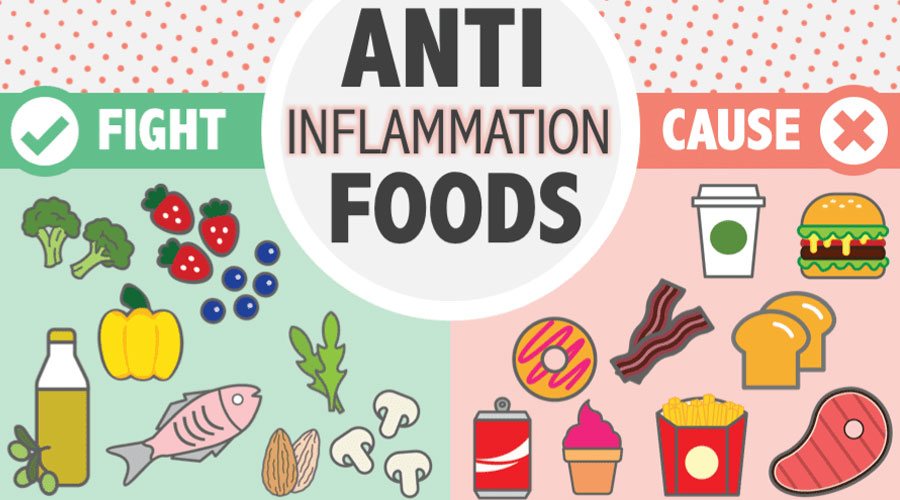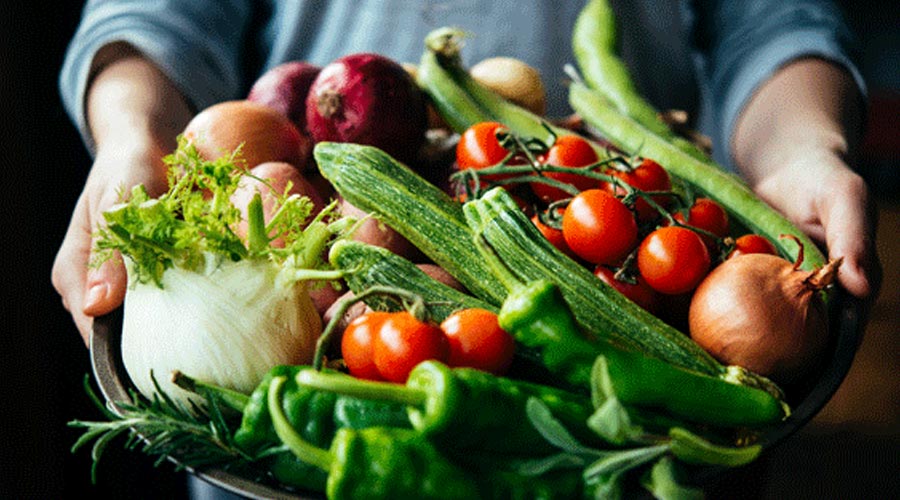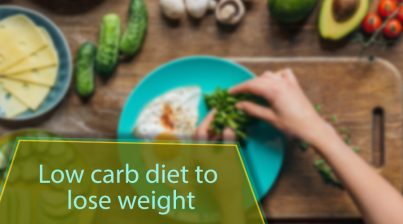Do you suffer from chronic pain? If so, you may want to consider following an anti-inflammatory diet. An anti-inflammatory diet is a way of eating that focuses on foods that help reduce inflammation in the body. Inflammation is responsible for many chronic conditions, including arthritis, asthma, and heart disease. By eating anti-inflammatory foods, you can help reduce inflammation and improve your overall health! In this blog post, we will discuss the foods that you should eat and avoid on an anti-inflammatory diet.
Table of Contents
What is inflammation?
Inflammation is a response by the body’s immune system to protect against infection or injury. When inflammation occurs, white blood cells and chemicals are released into the bloodstream to fight off the foreign invader. This can cause redness, swelling, increased inflammatory markers, and pain. Inflammation is a normal response by the body; however, chronic inflammation can lead to many types of cardiovascular disease. Some of these health problems include arthritis, asthma, and heart disease.

Chronic inflammation is caused by a number of different factors, including:
- Poor diet
- Lack of exercise
- Smoking
- Stress
- Exposure to environmental toxins
- Aging
Inflammation begins when the body’s immune system is activated in response to a foreign invader, such as a virus or bacteria. When this occurs, white blood cells and chemicals are released into the bloodstream to fight off the intruder. This can cause redness, swelling, and pain.
Know the Difference of Testosterone Enanthate vs Cypionate
What is an anti-inflammatory diet?
An anti-inflammatory diet is a type of diet that helps to reduce inflammation. Inflammation is a natural process that occurs in the body when it’s fighting off infection or injury. However, chronic inflammation can lead to pain, swelling, and damage to the body’s tissues.

What are the benefits of an anti-inflammatory diet?
An anti-inflammatory diet has many potential health benefits. It can help reduce chronic pain, improve heart health, and decrease the risk of some chronic diseases. Additionally, an anti-inflammatory diet is a healthy way of eating for overall health and wellness!
Some of the specific benefits of an anti-inflammatory diet include:
- Relief from chronic pain: Inflammation is a leading cause of chronic pain. By following an anti-inflammatory diet, you can help reduce inflammation and relieve pain.
- Improved heart health: Inflammation is linked to many heart diseases, such as atherosclerosis and heart attack. An anti-inflammatory diet can help improve heart health by reducing inflammation.
- Decreased risk of chronic diseases: Chronic inflammation is linked to many chronic diseases, such as arthritis, asthma, and diabetes. By following an anti-inflammatory diet, you can decrease your risk of these diseases.
Foods to eat
What foods should I eat on an anti-inflammatory diet?

There are many anti-inflammatory foods that you can include in your diet. Some of the best anti-inflammatory foods include:
- Omega-rich fish: Salmon, trout, herring, and mackerel are all high in omega-fatty acids, which help reduce inflammation. Try incorporating at least two servings of omega-rich fatty fish into your weekly diet.
- Leafy green vegetables: Spinach, kale, and collard greens are all excellent anti-inflammatory foods. Include a leafy green vegetable at every meal to get the most benefit.
- Nuts and seeds: Almonds, walnuts, flaxseeds, and chia seeds are all high in anti-inflammatory nutrients. Snack on a handful of nuts or seeds throughout the day to reduce inflammation.
- Olive oil: Olive oil is rich in anti-inflammatory antioxidants. Use olive oil as your primary cooking fat to reduce inflammation.
- Berries: Blueberries, strawberries, and raspberries are all high in anti-inflammatory antioxidants. Enjoy a handful of berries as a snack or add them to your breakfast cereal.
Omega-3 fatty acids, which are present in oily fish, may help reduce the levels of inflammatory proteins in the body. Fiber can also have this effect, according to the Arthritis Foundation.
See More About Testosterone Tabs Use
Foods to avoid
What foods should I avoid on an anti-inflammatory diet?

There are some foods that can trigger inflammation and should be avoided on an anti-inflammatory diet. These inflammatory foods include:
- Processed meats: Bacon, ham, sausage, and other processed meats contain unhealthy chemicals and are high in saturated fat that can promote inflammation. Avoid these meats whenever possible.
- Refined carbs: White bread, pasta, and rice are all high in refined carbohydrates which can increase inflammation. Choose whole-grain versions instead for healthier inflammation control.
- Sugar: Sugar is a leading cause of inflammation. Avoid foods and drinks high in sugar to reduce inflammation.
- Gluten: Gluten is a protein found in wheat, barley, and rye. Some people are intolerant to gluten and experience inflammation when they eat it. Eliminate gluten from your diet if you suspect that you are intolerant to it.
- Dairy: Many people are intolerant to dairy and experience inflammation when they consume it. Avoid dairy products if you notice that you feel bloated or congested after eating them.
- Nightshade vegetables: Nightshade vegetables such as tomatoes, peppers, eggplant, and potatoes can trigger inflammation for some people. If you find that nightshades aggravate your symptoms, avoid them.
An anti-inflammatory diet is a healthy way to reduce inflammation and improve your overall health. By following an anti-inflammatory diet, you can experience relief from chronic pain, maintained blood sugar levels, improved heart health, and decreased risk of chronic disease. Include anti-inflammatory foods in your diet today for the best results!
The role of your diet
The role of your diet in managing pain and inflammation is an important one. The anti-inflammatory diet can be incredibly helpful in reducing chronic pain, improving heart health, and decreasing the risk of some chronic diseases. Be sure to add anti-inflammatory foods like omega-rich fish, whole grains, leafy green vegetables, nuts and seeds, and olive oil to your diet today!
If you suspect that you have an intolerance to gluten, dairy, or nightshade vegetables, avoid these foods to reduce inflammation. And remember, always consult with a healthcare professional before making any changes to your diet.
Types of an anti-inflammatory diet
There are two types of anti-inflammatory diets: the Mediterranean diet and the anti-inflammatory diet for arthritis.
The Mediterranean diet has been found to be very effective in reducing inflammation. The diet is based on whole, unprocessed foods and includes plenty of anti-inflammatory ingredients like omega-3 fatty acids, vegetables, and fruits. Additionally, the Mediterranean diet is high in healthy fats such as olive oil, nuts, and avocados, which can help reduce inflammation in the body. If you are looking for an anti-inflammatory diet to follow, the Mediterranean diet is a great option.

If you are looking for an anti-inflammatory diet to follow, the anti-inflammatory diet for arthritis is a great option. This diet focuses on eliminating certain foods that trigger inflammation, such as sugar, gluten, dairy, and nightshade vegetables. By following this diet, you can experience relief from chronic pain and inflammation. Be sure to add anti-inflammatory foods like omega-3 fatty acids, leafy green vegetables, nuts and seeds, and olive oil to your diet today!
Know More About Sustanon 250 for Sale
One-day menu
What are some good anti-inflammatory recipes?
Some good anti-inflammatory recipes include salmon with roasted Brussels sprouts and sweet potatoes, chicken with quinoa and kale, and lentil soup with ginger and turmeric. These recipes are all packed with anti-inflammatory ingredients that can help reduce inflammation and improve your health. Give them a try!
Here is a one-day menu of anti-inflammatory foods:
Breakfast
Spinach and feta omelet with avocado
Lunch
Arugula salad with grilled salmon
Snack
Almonds
Dinner
Roasted Brussels sprouts and sweet potatoes with chicken breast
Who can it help?

The anti-inflammatory diet can help anyone looking to reduce inflammation and improve their overall health. However, the anti-inflammatory diet is especially beneficial for those with chronic pain, heart disease, and other chronic conditions. If you are looking for a way to reduce inflammation and improve your health, the anti-inflammatory diet is a great option!
Summary
The anti-inflammatory diet is a healthy way to reduce inflammation and improve your overall health. By following an anti-inflammatory diet, you can experience relief from chronic pain, improved heart health, and decreased risk of chronic disease. Include anti-inflammatory foods in your diet today for the best results!
Here are a few tips for following an anti-inflammatory diet:
- Include anti-inflammatory foods like omega-rich fish, leafy green vegetables, nuts and seeds, and olive oil in your diet.
- Avoid dairy products if you notice that you feel bloated or congested after eating them.
- Avoid nightshade vegetables if they aggravate your symptoms.
- The Mediterranean diet is a great option for an anti-inflammatory diet.
- The anti-inflammatory diet for arthritis is a great option for an anti-inflammatory diet.
If you are looking for a way to reduce inflammation and improve your health, the anti-inflammatory diet is a great option! Try adding some anti-inflammatory foods to your diet today!
FAQ’s
What is the fastest way to reduce inflammation in the body?
There is no one-size-fits-all answer to this question, as the best way to reduce inflammation may vary depending on the individual. However, some anti-inflammatory foods that can help reduce inflammation include omega-rich fish, leafy green vegetables, nuts and seeds, and olive oil. Additionally, the anti-inflammatory diet for arthritis is a great option for those looking to reduce inflammation.
What is the best diet to reduce inflammation?
There is no one-size-fits-all answer to this question, as the best anti-inflammatory diet may vary depending on the individual. However, some anti-inflammatory foods that can help reduce inflammation include omega-rich fish, leafy green vegetables, nuts and seeds, and olive oil. Additionally, the anti-inflammatory diet for arthritis is a great option for those looking to reduce inflammation. Try adding some anti-inflammatory foods to your diet today! You may be surprised at how much of a difference they make!
Are eggs inflammatory or anti-inflammatory?
Some people believe that eggs are inflammatory, while others believe they are anti-inflammatory. The verdict is still out on this one! However, if you notice that you feel bloated or congested after eating eggs, it may be best to avoid them. Try adding some other anti-inflammatory foods to your diet and see how you feel.
What are 10 anti-inflammatory foods?
Some anti-inflammatory foods include omega-rich fish, leafy green vegetables, nuts and seeds, and olive oil. Additionally, the anti-inflammatory diet for arthritis is a great option for those looking to reduce inflammation. Try adding some of these anti-inflammatory foods to your diet today!
Some other anti-inflammatory foods include:
- Beets
- Bell peppers
- Broccoli
- Cauliflower
- Garlic
- Ginger
- Kale
- Lemon juice
And there you have it – ten anti-inflammatory foods to add to your diet today for pain relief! If you’re looking for more ideas, be sure to check out the whole article!
Are eggs inflammatory?
While the jury is still out on this one, some people believe that eggs are inflammatory. If you notice that you feel bloated or congested after eating eggs, it may be best to avoid them. Try adding some other anti-inflammatory foods to your diet and see how you feel.
What are some good anti-inflammatory breakfast options?
Some good anti-inflammatory breakfast options include oatmeal with berries, a green smoothie, or eggs cooked in olive oil. Additionally, the anti-inflammatory diet for arthritis is a great option for those looking to reduce inflammation. Try adding some of these anti-inflammatory foods to your diet today! You may be surprised at how much of a difference they make!





